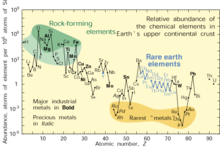- Natural abundance
-
In chemistry, natural abundance (NA) refers to the abundance of isotopes of a chemical element as naturally found on a planet. The relative atomic mass (a weighted average) of these isotopes is the atomic weight listed for the element in the periodic table. The abundance of an isotope varies from planet to planet but remains relatively constant in time.
As an example, uranium has three naturally occurring isotopes: 238U, 235U and 234U. Their respective NA is 99.2745%, 0.72% and 0.0055%. For example, if 100,000 uranium atoms were analyzed, one would expect to find approximately 99,275 238U atoms, 720 235U atoms, and no more than 5 or 6 234U atoms. This is because 238U is much more stable than 235U or 234U, as the half-life of each isotope reveals: 4.468×109 years for 238U compared to 7.038×108 years for 235U and 245,500 years for 234U. However, the natural abundance of a given isotope is also affected by the probability of its creation in nucleosynthesis (as in the case of samarium; radioactive 147Sm and 148Sm are much more abundant than stable 144Sm) and by production of a given isotope by natural radioactive isotopes (as in the case of radiogenic isotopes of lead).
Contents
Deviations from natural abundance
We now know from study of the sun and primitive meteorites that our solar system was initially almost homogeneous in isotopic composition. Deviations from the (evolving) galactic average, locally-sampled around the time that the sun's nuclear burning began, can generally be accounted for by mass fractionation (see the article on mass-independent fractionation) plus a limited number of nuclear decay and transmutation processes.[1] There is also evidence for injection of short-lived (now extinct) isotopes from a nearby supernova explosion that may have triggered solar nebula collapse.[2] Hence deviations from natural abundance on earth are often measured in parts per thousand (per mil or ‰) because they are less than one percent (%).
The single exception to this lies with the presolar grains found in primitive meteorites. These bypassed the homogenization, and often carry the nuclear signature of specific nucleosynthesis processes in which their elements were made.[3] In these materials, deviations from "natural abundance" are sometimes measured in factors of 100.
See also
Footnotes and References
- ^ Robert N. Clayton (1978) Isotopic anomalies in the early solar system, Annual Review of Nuclear and Particle Science 28:501-522.
- ^ Ernst Zinner (2003) An isotopic view of the early solar system, Science 300:5617, 265-267.
- ^ Ernst Zinner (1998) Stellar nucleosynthesis and the isotopic composition of presolar grains from primitive meteorites, Annual Review of Earth and Planetary Sciences 26:147-188.
External links
Categories:- Chemical properties
- Isotopes
Wikimedia Foundation. 2010.

